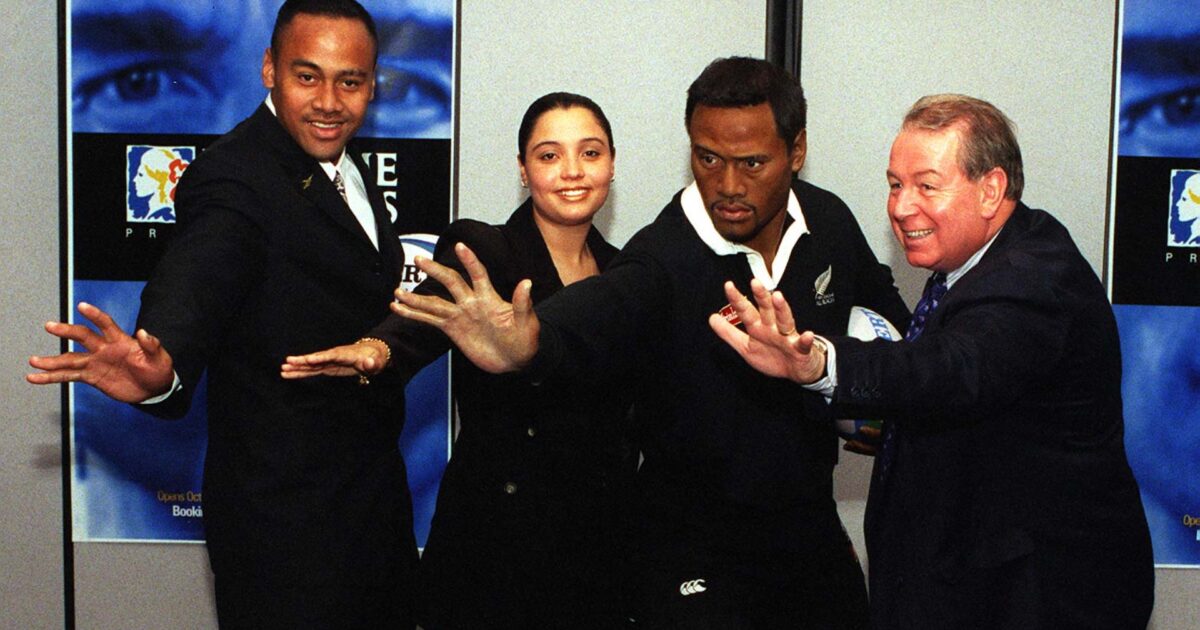Jonah Lomu's former manager Phil Kingsley Jones passes away

Phil Kingsley Jones, the former manager of Jonah Lomu and the man famously credited with keeping the late All Blacks great from leaving rugby for league, has passed away. A family member of the 72-year-old Welshman had recently confirmed to the New Zealand Herald that he had been “recovering at home” after falling five months ago.
Jones was Lomu’s manager for ten years until 2004 when the former All Black’s wife Fiona took over his management. Without him, Lomu might have played out his career in the Australian league.
Welsh-born Jones had come to New Zealand in 1983, driving a truck during the week, propping a rugby scrum for Mt Wellington on Saturday afternoons, and working as a stand-up comedian on Saturday nights.
At the height of his show business success in the 1990s he sold out shows when on stage with former All Black Stu Wilson, and the duo published five big-selling books.
Jones started working with the Counties Manukau Rugby Union in 1989 and first crossed paths with Lomu when the already massive South Auckland teenager was at Wesley College.
Among many other great qualities, Phil Kingsley Jones always made you feel like you were the best thing to happen to him that day. Even if for a moment, before he made the next person feel the same way. Also had an endless supply of truly blue jokes. RIP Champion.
— Scotty Stevenson (@sumostevenson) September 16, 2020
In 1994, a year before rugby went professional, Lomu was offered a $300,000 a year deal to play league for the Canterbury Bulldogs in Sydney. Dropped by the All Blacks after two Tests against France in 1994 and disillusioned with rugby, Lomu decided to sign with the Bulldogs, asking Kingsley-Jones to draw up a formal contract to manage him.
At the time Jones said he would manage Lomu, but on one crucial condition – he had to stick with rugby and when he wins back his place in the All Blacks, he must give Jones the jersey he wears. And so it was that Jones would receive a 1995 World Cup jersey from Lomu – and Lomu would be the key to a US$555million television contract for southern hemisphere rugby.
Jones worked at Counties Manukau Rugby for 15 years over two periods from 1989–1996 and 2009-2017. In that time, he served as the club’s coaching co-ordinator, coaching director, coach of the development team, coach of junior representative teams, sponsorship and business development manager.
He was made a lifetime ambassador for the union, and the lounge at the Steelers’ home ground, Navigation Homes Stadium in Pukekohe, was named after him. He also coached the Tongan national team, taking them on two tours to South Africa and the United Kingdom, which helped them qualify for the 1999 World Cup.
Former Steelers and Maori captain Errol Brain who knew Jones closely said: “This is a truly sad day for Counties Manukau and rugby.
“Phil would be one of the only people who could walk into any rugby club in the world and know someone who would want to buy him a beer. His larger than life personality, sharp brain and ability to think outside the square was a great gift.
“What he did for Jonah Lomu was ground-breaking. He was the pioneer who turned Jonah into rugby’s first global superstar all while keeping him grounded and connected to what was important, which was our region. Such was the impact that many of the young ones coming through today still look up to him and are aware of Jonah’s legacy.”
– New Zealand Herald
It's been less than a fortnight since Ian Foster named his first #AllBlacks squad, but New Zealand's head coach is already planning on adding a further 10 to 11 players to his 35-man side for the #RugbyChampionship.https://t.co/erh0OiZ2mR
— RugbyPass (@RugbyPass) September 16, 2020









































































